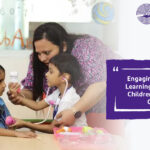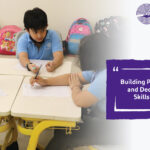In today’s rapidly changing world, academic success is essential—but it’s not enough. Our children also need to learn life skills that will empower them to navigate challenges, build strong relationships, and step confidently into the future. Here’s a detailed look at ten vital life skills every child should develop during their school years.
Table of Contents
1. Effective Communication
Being able to express one’s thoughts, listen well and connect with others makes a big difference in both school and life. Children should learn to speak clearly, write with purpose, ask questions, and understand what others mean. At Pragyanam School, students practice communication through group discussions, presentations and peer interactions—all in a safe, encouraging environment.
2. Critical Thinking and Problem-Solving
Life often presents questions without simple answers. Teaching children how to analyse situations, ask good questions, weigh options and decide wisely helps them face problems with confidence. For instance, a project-based learning activity at Pragyanam encourages students to identify a problem in their school or community, research it and propose an effective solution—fostering both thinking and action.

3. Decision-Making and Responsible Choices
Every day, children make small decisions what to wear, what to study, how to use their time. Learning to make responsible choices, considering consequences and owning their actions builds maturity. At Pragyanam, students reflect on decisions (both good and not-so-good) through classroom activities, helping them understand how their choices shape outcomes.
4. Time Management and Organising Skills
Time is precious and learning to use it well is a skill that benefits children throughout life. They should learn to prioritise tasks, create schedules and balance work with rest and play. Pragyanam’s students use planners, set achievable goals and are taught the value of finishing tasks on time while still enjoying their hobbies and downtime.
5. Emotional Intelligence and Self-Awareness
Understanding feelings one’s own and those of others is key to healthy relationships and personal well-being. By developing emotional intelligence (EQ), children learn self-awareness, empathy and control over their reactions. Pragyanam fosters this through mindfulness sessions, peer-mentoring and classroom discussions around emotions, helping children become resilient, kind and self-aware.
6. Financial Literacy
Money matters sooner than ever. Children should know basics like saving, budgeting, differentiating between wants and needs, and making informed decisions. At Pragyanam School, simple activities such as mock markets or allowance-based exercises give students early exposure to financial thinking setting a foundation for lifelong money-management habits.
7. Teamwork and Collaboration
Most environments school, workplace and social settings—involve working with others. Children should learn how to cooperate, share ideas, resolve conflicts and succeed as part of a team. Pragyanam encourages collaborative projects, team games and group tasks where children practise listening, contributing, and building together.
8. Adaptability and Resilience
Change is constant. Children who can adapt, bounce back from challenges and keep learning become better equipped for future success. At Pragyanam, children are encouraged to step out of comfort zones whether through new activities, competitions or leadership roles so they learn that setbacks aren’t failures but opportunities for growth.
9. Personal Care, Hygiene and Healthy Habits
Taking care of oneself is fundamental. Skills like maintaining hygiene, managing health, getting enough sleep and staying active are life-long assets. In school and at home, Pragyanam emphasises habits such as hand-washing, healthy eating, regular exercise and self-care routines helping children stay fit, organised and confident.
10. Citizenship, Environmental Awareness and Social Responsibility
A well-rounded education includes awareness of the world and the role one can play. Children should learn respect for the environment, empathy for others and the importance of contributing to society. Pragyanam involves students in clean-up drives, eco-projects and community service so they grow into responsible citizens and change-makers.
Why These Skills Matter
- Holistic Development: Life skills add depth to academic learning by shaping character and behaviour.
- Real-World Readiness: These skills prepare students for the challenges of adulthood, jobs and relationships.
- Lifelong Value: Whether in personal life or career, these habits and abilities stay with the child well beyond school.
- Resilient Mindset: Children develop confidence, self-regulation and the ability to face uncertainty positively.
How Pragyanam School Makes It Happen
- Integrates life skill modules into the curriculum alongside academics.
- Encourages experiential learning: activities, role-plays, community projects.
- Monitors student progress not just through grades, but through growth in these skills.
- Engages parents and teachers as partners in skill-development at home and school alike.
Next Steps for Parents
- Encourage your child to practise one new skill each month (e.g., budgeting, cleaning their room or working on a group project).
- Talk about emotions, decisions and teamwork at home to reinforce what they learn at school.
- Celebrate efforts, not just results recognising resilience, kindness and collaboration builds confidence.
- Stay connected with school activities and support opportunities for your child to lead, reflect and grow.
At Pragyanam School, we believe that education is not just about passing exams it’s about preparing children for life. By nurturing these ten key life skills, we equip our students to shine academically, relate meaningfully with others, take charge of their growth and step into the future with purpose and confidence.





